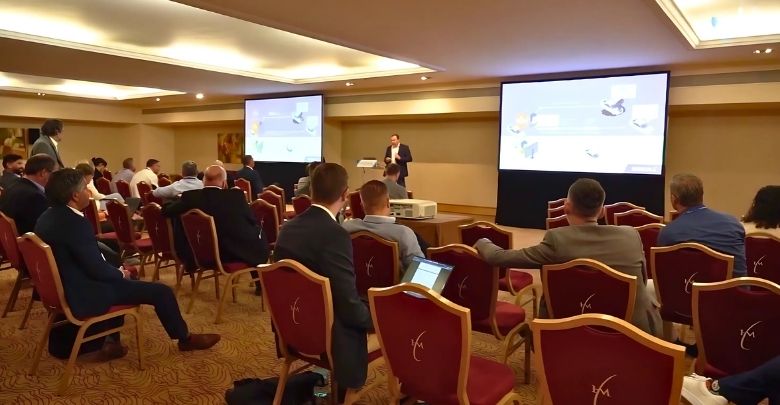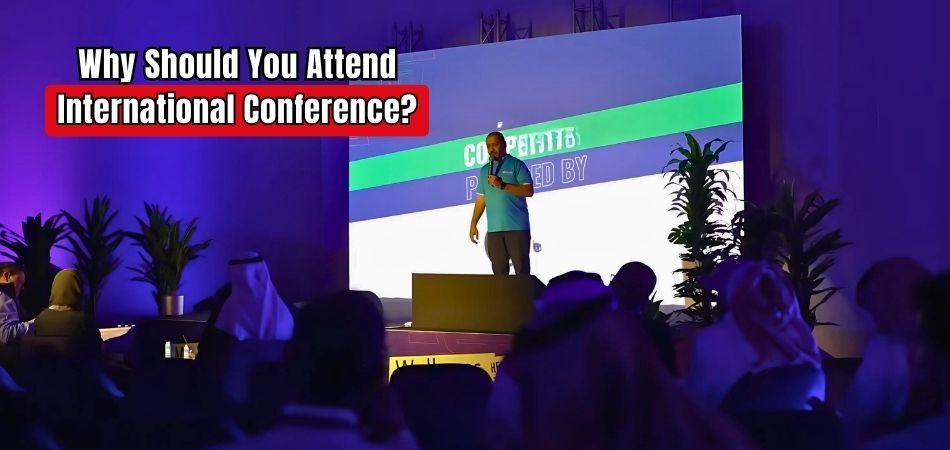Globalization has made international conferences increasingly important events. They bring together professionals, scholars, and innovators from various countries to share ideas and collaborate on global issues. If you’re wondering, why should you attend an international conference? you’re not alone
Attending an international conference offers countless opportunities for networking, learning, and professional growth. You can gain insights into the latest developments in your field, meet experts and peers from around the world, and share your own work on a global platform. It’s an experience that can significantly enhance your career.
Are you curious to learn more about the benefits and opportunities that international conferences provide? Keep reading, and you’ll discover all the essential information on why attending such events can be a game-changer for your professional journey.
Historical Overview of an International Conference
For centuries, international conferences have been an integral part of academic and professional development. They bring together scholars, researchers, and industry leaders from around the world to exchange ideas and present innovative work. The tradition of international conferences began in the late 19th century, initially focusing on scientific research, but has since expanded to cover nearly every field imaginable.

These gatherings serve as critical platforms for cross-border collaboration, allowing participants to stay updated on global trends, new technologies, and research advancements. Over time, international conferences have evolved to include workshops, panel discussions, and networking sessions, offering diverse ways for attendees to engage with one another and foster new connections.
With the rise of digital technology, conferences have become more accessible, often featuring hybrid or virtual formats to reach a broader audience. This has made it easier for professionals from different parts of the world to participate, ensuring that geographical barriers no longer limit opportunities for collaboration. Today, many conferences are not limited to physical venues, offering global access to ideas and innovations.
For those looking to find events that match their interests, checking an upcoming international conference list can help you stay informed about various opportunities. Whether you’re looking to attend in-person or virtually, keeping track of relevant conferences ensures you don’t miss out on important gatherings in your field.
Why Should You Attend an International Conference?
A conference can make a significant difference in your professional development. These events provide unique opportunities and sharing ideas with experts in your field. Here are some compelling reasons to consider participating in one.
Networking Opportunities
One of the biggest advantages of attending an international conference is the chance to network with professionals from around the world. You can meet industry leaders, researchers, and peers who share your interests. Building these connections can lead to collaborations, job opportunities, and valuable friendships that can support your career in the long run.
Introduction to the Latest Research
Various fields of research and innovation are showcased at international conferences. By attending, you gain insights into emerging trends and innovative studies that can inspire your own work. Introduction to the latest research not only broadens your knowledge but also enhances your ability to contribute meaningfully to discussions in your area of expertise.
Skill Development
Many conferences offer workshops and sessions focused on skill development. These can range from technical skills to soft skills, such as public speaking and leadership. Participating in these sessions allows you to learn from experts, practice new skills, and apply them in your professional life, thus improving your overall competence.
Sharing Your Work
Participating in an international conference allows you to present your own work. Sharing your work with a wider audience can lead to constructive feedback and new perspectives. It also helps establish your presence in the field and can improve your reputation as a researcher or professional.
Cultural Exchange
Individuals from diverse cultural backgrounds attend international conferences. Engaging with attendees from different countries allows for rich cultural exchange and new viewpoints. This experience can deepen your understanding of global issues, enhance your communication skills, and foster a more inclusive mindset in your professional practice.
Access to Expert Speakers
Conferences often feature keynote speakers who are leaders in their fields. Listening to their presentations can provide invaluable insights into industry trends and future directions. These sessions also offer the opportunity to ask questions and engage in discussions, giving you access to knowledge that may not be available elsewhere.
Professional Recognition
It can be beneficial to your professional reputation to attend international conferences and participate in them. It shows your commitment to your field and your willingness to engage with the global community. This recognition can open doors to future opportunities, including collaborations, research grants, and potential job offers.
A conference can have a significant impact on your professional development due to its numerous benefits. From networking to gaining exposure to the latest research, these experiences can enrich your career and broaden your horizons. Embracing these opportunities can pave the way for future success in your field.
Types of International Conference You Can Attend
There are many benefits associated with attending international conferences, including the opportunity to learn, make contacts, and share knowledge. The type of conference you choose can shape your experience and align with your career goals. Below are different types of conferences you can attend.
- Academic Conferences: These conferences are typically focused on presenting research findings, sharing theoretical insights, and discussing methodologies. Scholars and students from universities around the world come together to exchange ideas and collaborate on future projects.
- Industry-Specific Conferences: A specific industry’s professionals gather for these events to discuss trends, technologies, and challenges. They provide valuable opportunities to network with industry leaders, attend workshops, and learn about new developments within your sector.
- Business and Leadership Conferences: Focused on corporate growth, business innovation, and leadership strategies, these conferences help participants enhance their management and entrepreneurial skills. Attendees often include executives, entrepreneurs, and professionals eager to learn from leading experts.
- Technology and Innovation Conferences: Tech-focused conferences gather innovators, developers, and entrepreneurs to showcase new technologies and future trends. Attendees can explore cutting-edge innovations and network with experts who are shaping the future of the technology landscape.
- Medical and Healthcare Conferences: Healthcare professionals, researchers, and practitioners attend these conferences to discuss advancements in medical research, patient care, and healthcare policies. These gatherings play a crucial role in keeping professionals up-to-date with breakthroughs in the field.
- Cultural and Social Science Conferences: These events often focus on humanities, social issues, and cultural studies. Participants engage in discussions about societal trends, cultural shifts, and global challenges, providing a platform for interdisciplinary collaboration and policy development.
- Environmental and Sustainability Conferences: Focused on climate change, sustainability practices, and environmental conservation, these conferences attract scientists, activists, and policymakers. They promote discussions on global environmental issues, offering solutions for a more sustainable future.
Choosing the right type of international conference depends on your professional interests and goals. Each type of conference offers a unique set of opportunities for networking, learning, and personal growth. Taking part in these events can significantly impact your career trajectory.
How to Find the Right International Conference for You?
Your professional development and networking opportunities will be enhanced if you attend the right international conference. With countless options available, it’s important to choose one that aligns with your interests and career goals. Here’s how to find the right conference for you.
Define Your Objectives
Before starting your search, clearly define what you hope to achieve by attending a conference. Understanding your goals will guide you as you take the steps to participate in international conferences that align with your objectives, whether it’s networking, presenting research, or gaining new insights in your field. This clarity helps you focus on finding the most relevant conferences.
Research Relevant Conferences
Make use of academic databases, professional associations, and online platforms to identify upcoming conferences that match your interests. Look for conferences that focus on your area of expertise or professional development. Pay attention to their themes, topics, and speakers to ensure they are relevant to your work.
Analyze Conference Reputation
The reputation of a conference is crucial for its validity and the value you will gain from attending. Investigate past events organized by the same body and read testimonials from previous participants. Established conferences typically feature quality presentations and reputable speakers, enhancing your overall experience.
Consider Location and Timing
Make sure the conference location and timing suit your schedule and travel preferences. Choose conferences held in accessible places that allow for easy participation. Additionally, consider how the conference timing aligns with your personal and professional commitments to maximize your engagement.
Review Submission Guidelines
If you plan to present your work, carefully review the conference’s submission guidelines. Ensure that the topics align with your research and that you can meet the submission requirements. Understanding the process is essential for successful participation, including the key steps for presenting your work.
Finding the right international conference involves careful research and consideration of various factors. By defining your objectives and analyzing options, you can select a conference that will provide valuable insights and networking opportunities. Take advantage of the opportunity to expand your knowledge and connect with others in your field.
Tips for Making the Most of Your International Conference Experience
Taking part in an international conference offers valuable opportunities to grow professionally, connect with peers, and learn from global experts. To fully benefit from the experience, it’s important to plan ahead and make the most of every moment.
Prepare in Advance
Before attending the conference, take time to thoroughly review the event schedule and identify key sessions, speakers, and networking opportunities that align with your interests. Preparing questions or topics for discussion can help you engage more effectively with fellow attendees and speakers.
Engage Actively in Sessions
During sessions, stay engaged by taking notes and participating in discussions. Asking insightful questions or offering relevant comments can help you stand out and foster meaningful connections with speakers and other participants. Engaging actively shows your commitment to learning and contributing to the conversation.
Network Strategically
Taking part in an international conference provides you with the opportunity to network with other participants. Use breaks and social events to meet key people in your field. Having a clear introduction and knowing your professional goals will make your conversations more productive.
Follow Up After the Conference
After the event, follow up with the connections you’ve made. Send personalized emails to express your appreciation and explore opportunities for future collaboration. This proactive step will help strengthen your professional network and ensure lasting relationships that extend beyond the conference.
Present Your Research to Maximize Impact
If you’re presenting at the conference, ensure your presentation is clear and impactful. One of the advantages of presenting research at global conferences is the visibility it brings to a wider audience, allowing you to showcase your work on an international platform and receive valuable feedback.
Making the most of your international conference experience requires preparation, active participation, and strategic networking. Whether you’re attending to learn, present, or connect, the experience can significantly boost your career and professional development when approached with focus and intention.
Frequently Asked Questions
It can be beneficial for your professional development, networking, and learning experiences to attend an international conference. Below are some frequently asked questions to help you understand the importance and impact of participating in such events.
What Are the Networking Benefits of International Conferences?
The networking opportunities provided by international conferences are extraordinary. You can meet industry leaders, collaborate on projects, and even discover job opportunities. These events allow you to connect with like-minded individuals, opening doors to long-term professional relationships and collaborations.
How Do International Conferences Help in Career Advancement?
Taking part in international conferences enhances your visibility within your field. By engaging in discussions and presenting your work, you establish credibility and gain recognition from peers and experts. This exposure can lead to invitations for future collaborations, research grants, or even job opportunities, helping you advance your career.
How Can I Prepare for an International Conference?
It is important to research the conference agenda, understand the key speakers, and identify sessions that are relevant to your interests before you attend. Preparing questions or topics for discussion helps you engage effectively. Additionally, ensuring your online profiles are updated can help you connect with peers and presenters during and after the event.
What Role Do International Conferences Play in Skill Development?
During international conferences, you can attend workshops and sessions that will improve both your technical and soft skills. From improving public speaking to gaining insights into the latest tools and technologies, these events provide opportunities for personal development. You can practice and apply these new skills in your professional life.
Are International Conferences a Good Platform for Presenting Research?
Yes, presenting research at international conferences gives you global exposure. You get feedback from experts and peers, which can improve your work. It’s also a great opportunity to showcase your research on an international stage, further boosting your professional profile and credibility.
Bottom Line
An international conference offers invaluable opportunities for growth on both a personal and professional level. These events not only provide a platform to share knowledge but also facilitate connections with experts and peers from diverse backgrounds. Engaging with a global audience can significantly enrich your understanding of various subjects and industries.
So, why should you attend an international conference? The answer lies in the myriad benefits it offers, including networking opportunities, inroduction to the latest research, and skill development. By participating, you can elevate your professional presence and contribute meaningfully to discussions within your field, making a lasting impact.
Plan ahead, participate actively in sessions, and network strategically as you prepare for your next conference. Take notes, follow up with connections, and learn as much as you can. Wishing you success on your next international conference.







